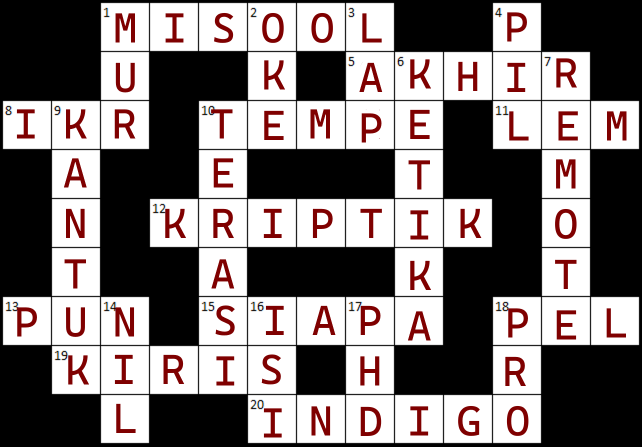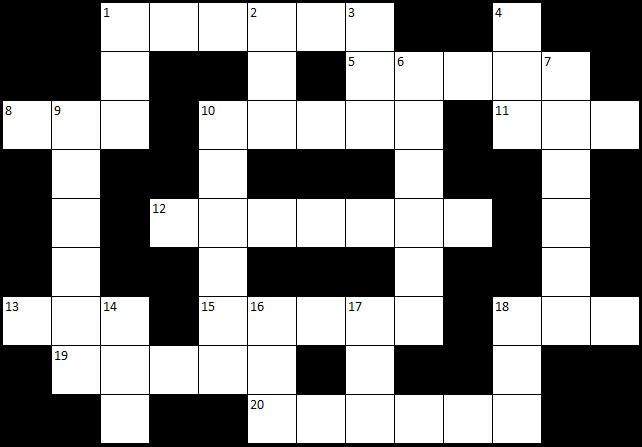In the chatroom created by North, he and I have been attacking this, and we've finally done it.
Here's the grid:

Wordplay explanations -- across clues:
1a. [bumbu Jepang -> MISO] + [jual murah -> OBRAL] minus [pakaian dalam -> BRA]; Misool is one of the Raja Anpat islands.
5a. [alam baka -> AKHIRAT] minus [di dalam Bahasa Inggris -> AT, because "at" is one English translation of "di"]; def is "ujung".
8a. [janji -> IKRAT] minus [Amien Rais -> AR]; def is "sudah kubilang kan, disingkat di Inggris" -> "I know, right?" -> IKR.
10a. [ketika -> TEMPO] with [donat -> O] replaced by [nilai terendah -> E, lowest grade in exams]; def is "makanan dari kedelai".
11a. [salah satu jajanan tradisional -> LEMPER] minus [pegas -> PER]; def is "pelengket".
12a. Double def, or maybe single cryptic def.
13a. [permaianan kata Bahasa Inggris -> PUN]; def is "demikian".
15a. [sedia -> SIAP] before [nilai tertinggi -> A, highest grade in exams]; def is "seseorang yang belum tentu".
18a. [noda hitam -> TOMPEL] minus TOM; def is "kain pembersih".
19a. [dengki -> SIRIK] in reverse; def is "sebanga pohon kaku".
20a. Double def; "warna nila" is the colour, "memiliki kemapuan supranatural" is a reference to the New Age-y concept of "indigo child".
and down clues:
1d. [marah -> MURKA] minus [kereta api -> KA; I think this is a standard Indonesian abbreviation]; def is "pelat logam"; OP clarifies that a mur is a nut (as in "nuts and bolts"); I'm still a little puzzled how "metal plate" clues that, but no matter :-).
2d. [lingkungan kehidupan -> EKOSISTEM] minus [metode -> SISTEM], reversed. Def is "setuju".
3d. [pacuan -> BALAP] minus [plat nomor Sumatera Barat -> BA]; def is "penggosok".
4d. [Terjemahkan ke Bahasa Inggris: bibir -> LIP]< = PIL. Def is "tablet".
6d. KETIAK*; def is "Saat".
7d. METEOR*; def is "pengendali jarak jauh".
9d. [hewan gurun -> UNTA] anagrammed to ANTU inside [karta keluagra -> KK, standard Indonesian abbreviation]; def is "menguap" or maybe "[yang] membuat menguap". This uses an indirect anagram, which is a bit naughty.
10d. [saat -> ERA] inside [Taman Safari Indonesia -> TSI, which I assume is an obvious thing to abbreviate by its initials]; def is "bumbu sambal".
14d. Double def; NIL is both nothing (kosong) and the river Nile (salah satu nama sungai).
16d. [celah seperti pada pintu -> KISI] without its head; def is "inti".
17d. First part of clue means "doctoral study abroad"; second half has initials PHD. (Apparently this is a standard abbreviation in Indonesia.)
18d. [tidak setuju-> PROTES] minus [ujian -> TES]; def is "setuju".
For many of these there are more verbose, but also more disorganized, explanations in the chatroom linked above. (In particular, there are lots of Bahasa Indonesia -> English translations there.)
Thanks to athin for clarifying in comments some bits of wordplay that we missed.
Solving technique, if you can call it that:
Pick a clue. Translate it with Google Translate. Translate individual words and, where appropriate, phrases with Google Translate. Think of possible ways to parse as cryptic clues. Figure out what things we therefore need words for in Bahasa Indonesia, and get 'em with Google Translate again. Repeat until blood starts to pour from every orifice and/or you solve the clue. Repeat for other clues. (You can find some more concrete thinking-out-loud in the chatroom transcript.) In extreme cases, find Indonesian word lists like the ones here and search for words matching the patterns in the grid. We haven't done this much because it's (1) a bit cheaty and (2) a lot boring. For the last couple, I made use of a larger wordlist in the same GitHub repository. 18a: looked for words of form -E- and looked them all up in GT, looked for 6-letter words containing TOM, and saw that PEL and TOMPEL were good, with PEL even having the right sort of meaning. Google Translate didn't know TOMPEL (which is why we didn't find it earlier) but the Indonesian Wiktionary did. (Top tip: applying Google Translate to foreign-language Wiktionary pages seems to be quite effective.) With 18a out of the way, 18d was P-O and there weren't a lot of options; again Wiktionary was helpful, actually using the word "agree" to describe PRO (as opposed to KONTRA, when describing votes). Then another search of the bigger wordlist turned up PROTES and I felt very stupid for not thinking of that earlier. (Of course it means "protest", and a TES is a test or exam.)
That was a lot of fun, but also a lot of work.


